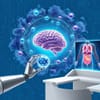The healthcare industry is on the cusp of a revolution, driven by the convergence of quantum computing and artificial intelligence. These technologies have the potential to transform various aspects of healthcare, from drug discovery and development to personalized medicine and medical imaging.
One of the most promising applications of quantum computing in healthcare is in drug discovery and development. Quantum computers can simulate molecular interactions more accurately and quickly, reducing the time and cost of bringing new drugs to market. This technology can help researchers understand how proteins interact with drugs, enabling targeted therapies for diseases like Alzheimer's and cancer.
Quantum AI can also enhance predictive models for patient outcomes, allowing for timely interventions and tailored treatment plans. By analyzing vast amounts of genetic data, quantum computers can help doctors predict how patients will respond to certain treatments. This can lead to more effective disease prevention and treatment, improving patient outcomes and saving lives.
In medical imaging and diagnostics, quantum computing can improve image processing speed and accuracy, enabling doctors to detect diseases like cancer earlier. Quantum-enhanced MRI scans could provide higher-resolution images, making it easier to identify abnormalities.
However, there are also challenges and limitations to consider. Quantum computers are still in development, and significant technical hurdles need to be overcome before widespread adoption. Ensuring data privacy and compliance with regulations like HIPAA and GDPR is crucial in a quantum ecosystem. Integrating quantum AI with existing healthcare systems without disrupting current operations is a significant challenge. Additionally, there's a shortage of professionals skilled in both quantum computing and AI, making cross-disciplinary training and education vital for future implementation.
Despite these challenges, the potential benefits of quantum computing and AI in healthcare are vast. By enabling faster and more accurate diagnostics, personalized treatment plans, and optimized clinical trials, these technologies can lead to better patient outcomes and more effective disease prevention. As the healthcare industry continues to evolve, it's likely that quantum computing and AI will play an increasingly important role in shaping its future.


